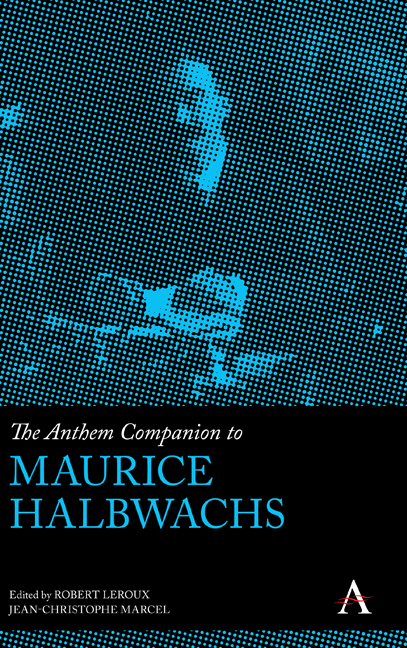Book contents
- Frontmatter
- Contents
- Introduction
- Chapter 1 A Theorist of Collective Memory
- Chapter 2 Halbwachs and the Durkheimian Perspective on History
- Chapter 3 Maurice Halbwachs, Sociologist of Memory: His Reception in Italy and the Development of the Sociology of Memory
- Chapter 4 Population as the Body of Society
- Chapter 5 Urban Morphology and Social Morphology: Marcel Roncayolo and the Work of Maurice Halbwachs
- Chapter 6 Halbwachs’s Leibniz and Halbwachs’s Sociology
- Chapter 7 Halbwachs on Quetelet and the Use of Statistics in Sociology
- Chapter 8 Maurice Halbwachs and the Sociology of Consumption and Social Classes
- Chapter 9 From Criticism of Moral to the Probalistic Test
- Chapter 10 The Age Criterion: Between Sociology and Biology
- Chapter 11 Speculation: Order or Disorder?
- List of Contributors
- Index
Chapter 6 - Halbwachs’s Leibniz and Halbwachs’s Sociology
Published online by Cambridge University Press: 23 February 2022
- Frontmatter
- Contents
- Introduction
- Chapter 1 A Theorist of Collective Memory
- Chapter 2 Halbwachs and the Durkheimian Perspective on History
- Chapter 3 Maurice Halbwachs, Sociologist of Memory: His Reception in Italy and the Development of the Sociology of Memory
- Chapter 4 Population as the Body of Society
- Chapter 5 Urban Morphology and Social Morphology: Marcel Roncayolo and the Work of Maurice Halbwachs
- Chapter 6 Halbwachs’s Leibniz and Halbwachs’s Sociology
- Chapter 7 Halbwachs on Quetelet and the Use of Statistics in Sociology
- Chapter 8 Maurice Halbwachs and the Sociology of Consumption and Social Classes
- Chapter 9 From Criticism of Moral to the Probalistic Test
- Chapter 10 The Age Criterion: Between Sociology and Biology
- Chapter 11 Speculation: Order or Disorder?
- List of Contributors
- Index
Summary
Before he became one of the prominent figures of French sociology, Maurice Halbwachs studied, first with Bergson, and later taught, philosophy. As a student of the École Normale Supérieure, which he entered in 1898, he was awarded third place in the agrégation de philosophie in 1901. He taught philosophy in the lycées (high schools) of Reims and Tours (until 1914) and Nancy (during World War I), before becoming a maître de conférences (a status more or less equivalent to that of an associate professor), in philosophy, at the University of Cæn. Shortly afterward, he obtained a newly created chair of Education and Sociology at the University of Strasbourg, a chair he held from 1919 to 1922, until it was transformed into the first full professorship of “sociology” (without addition or qualification) in France. He joined the Sorbonne in 1935.
Some of Halbwachs's first publications, and a number of later ones, were in philosophical journals, even though he had joined the editorial team of L’Année sociologique (led by Durkheim) as early as 1905. (This was not uncommon; Durkheim himself had published on a regular basis in such periodicals; and many of the first French sociologists had a philosophical background.)
His links with the philosophical milieu were not severed, as his regular contributions to the Revue philosophique de la France et de l’étranger and to the Revue de Métaphysique et de Morale clearly show; in August 1916, his sister Jeanne married Michel Alexandre, who would later become professor of philosophy at Louis le Grand and Henri IV, the most famous lycées of Paris.
There are, strictly speaking, no philosophical works of Halbwachs; one cannot help noticing, though, that his interest for one particular philosopher — Leibniz, namely — never faltered. In 1907 he published an introductory work to his thought, simply entitled Leibniz; this work, which has since become almost impossible to find, met with some success, since it was published in two editions (the second augmented by about 30 pages), each one printed twice, and in a Spanish translation (1943). In what follows, we shall quote the second edition (1928, 1950). In 1935, Halbwachs agreed to direct the dissertation (“The Problem of the Limitation of Creatures in Leibniz”) of a former pupil of Michel Alexandre, Bernard Gertzberg, whose untimely demise at the age of 22 led to its posthumous publication — with a short preface by Halbwachs (Gertzberg, 1937).
- Type
- Chapter
- Information
- The Anthem Companion to Maurice Halbwachs , pp. 99 - 108Publisher: Anthem PressPrint publication year: 2021



